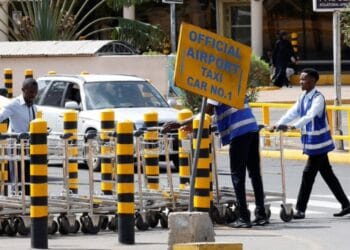Ruto Qatar JKIA upgrade deal 2025 takes centre stage as President William Ruto pitches a transformative KSh 200 billion overhaul to Qatari investors, brushing off wild rumours of airport privatisation as baseless mischief.
Speaking at a State House media roundtable on November 5, Ruto laid out his vision for Jomo Kenyatta International Airport, Kenya’s bustling gateway, while floating plans for a brand-new facility to ease the chronic congestion that’s turned takeoff times into a national joke.
“We’ve had discussions with Qatar about the necessary changes for JKIA.” Some Kenyans are claiming I want to sell JKIA. Of what benefit would that be to me?” Ruto quipped, his tone a mix of exasperation and resolve.
He doubled down: “We need to build a new airport, tuwache upuzi. This is about growth, not giveaway.” The overture to Doha comes amid Kenya’s aggressive hunt for foreign direct investment to plug a yawning infrastructure gap, with aviation flagged as a priority in the Bottom-Up Economic Transformation Agenda.
JKIA, handling over 8.5 million passengers yearly but designed for half that load, chokes under the strain: delayed flights, overcrowded lounges, and cargo backlogs that cost exporters Sh10 billion annually, per Kenya Airports Authority data.
Ruto’s pitch, hashed out during a September summit with Qatar’s Prime Minister Sheikh Mohammed bin Abdulrahman Al Thani, eyes a public-private partnership where Doha funds terminal expansions, runway extensions, and tech upgrades like automated baggage systems.
“Qatar’s expertise in world-class hubs like Hamad International makes them ideal partners. We’re talking KSh 200 billion over five years, creating 50,000 jobs and boosting GDP by 2 percent,” Treasury CS John Mbadi elaborated in a follow-up briefing, waving concept renders of a sleek, solar-powered second airport near Nairobi.
Sceptics, fuelled by social media storms, cry foul over sovereignty. Viral posts on X accused Ruto of “handing our skies to sheikhs”, with citizens criticising, “JKIA sale disguised as upgrade? Remember the SGR China trap.”
Ruto swatted them away, framing the deal as a lease-like model with Kenyan ownership intact, akin to Ethiopia’s Addis Ababa airport revamp that drew UAE cash without ceding control.
“This isn’t selling; it’s scaling. Imagine JKIA as efficient as Dubai’s, not a perpetual headache,” he urged, invoking the 2024 passenger surge of 12 per cent that exposed the facility’s frailties.
Aviation experts back him: A recent IATA report pegs JKIA’s inefficiencies at Sh50 billion in lost revenue yearly, urging mega-investments to capture East Africa’s air traffic boom.
Qatar’s interest isn’t pie-in-the-sky. The Gulf powerhouse, flush with sovereign wealth from LNG exports, has poured billions into African infrastructure: a $2 billion port in Senegal and rail links in Sudan.
For Kenya, it’s a lifeline post the 2023 floods that gutted runways and the ongoing SHIF rollout straining budgets. Ruto’s wooing spree included a charm offensive at the Qatar Economic Forum, where he touted Kenya’s 5.6 per cent growth forecast and tax reforms luring FDI.
“Doha sees us as a hub for their Africa push. This deal seals it,” Foreign Affairs PS Korir Sing’oei told journalists, hinting at bundled perks like preferential Qatar Airways slots at JKIA.
As cranes loom on the horizon, Ruto’s Qatar-JKIA upgrade deal in 2025 could redefine Kenya’s skies, turning a bottleneck into a bridge to prosperity. Or, if mishandled, fuel the fires of distrust. For now, the president bets on bold blueprints over bitter barbs, urging unity, “Tuwache upuzi, let’s build.”
















